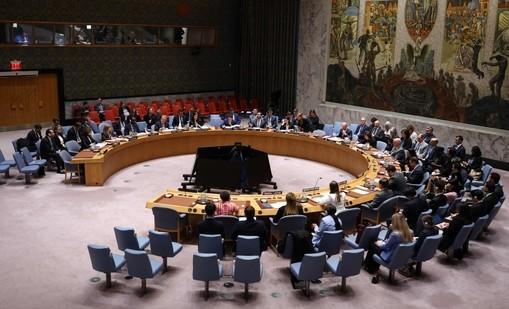
Title: Was LeT involved? UNSC asks Pak on J&K attack, refuses to accept ‘false flag’ claim
The United Nations Security Council (UNSC) has refused to accept Pakistan’s “false flag” narrative on the recent attack in Pahalgam, Jammu and Kashmir. In a closed-door meeting, UNSC members questioned if the Lashkar-e-Taiba (LeT), a terror outfit based in Pakistan, was involved in the attack. The meeting was requested by Pakistan, which had claimed that the attack was carried out by Indian forces to undermine its credibility.
The attack in Pahalgam, which took place on October 11, left several tourists injured, including a few foreigners. Pakistan had quickly peddled the “false flag” narrative, claiming that Indian forces had carried out the attack to create a rift between India and Pakistan. However, the UNSC members were not convinced by Pakistan’s claims and instead questioned the involvement of LeT, a group known for its terrorist activities in the region.
According to reports, some UNSC members brought up the targeting of tourists on the basis of religion, hinting that the attack may have been carried out with a communal motive. The meeting was a clear indication that the international community is not buying Pakistan’s narrative and is instead pushing for a thorough investigation into the attack.
The UNSC meeting comes amid heightened tensions between India and Pakistan over the recent attacks in the region. While India has blamed Pakistan-based terrorist outfits for the attacks, Pakistan has denied any involvement and instead accused India of carrying out “false flag” operations to destabilize its government.
The Pahalgam attack was the latest in a series of attacks in Jammu and Kashmir, which has been witnessing a surge in violence in recent months. The attacks have been carried out by terrorist outfits, including LeT, which has been designated as a terrorist organization by several countries.
Pakistan’s “false flag” narrative on the Pahalgam attack has been widely debunked by experts and analysts. They point out that the attack was carried out by a group of terrorists who were armed with sophisticated weapons and were well-trained in guerrilla warfare. The attack was also carried out in a region that is known for its tourist attractions and is a hub of economic activity.
The UNSC’s refusal to accept Pakistan’s narrative is a significant blow to the country’s efforts to deflect attention from its own role in the region’s terrorism. The international community has long been aware of Pakistan’s role in promoting terrorism in the region, and the UNSC’s stance is a clear indication that it is no longer willing to accept Pakistan’s denials.
The attack in Pahalgam has also raised concerns about the safety and security of tourists in the region. The attack has sent a clear message that terrorist outfits are still active in the region and are capable of carrying out attacks on civilians.
In conclusion, the UNSC’s refusal to accept Pakistan’s “false flag” narrative on the Pahalgam attack is a significant development in the ongoing saga of terrorism in Jammu and Kashmir. The UNSC’s stance is a clear indication that the international community is no longer willing to accept Pakistan’s denials and is instead pushing for a thorough investigation into the attack. The UNSC’s refusal to accept Pakistan’s narrative is a significant blow to the country’s efforts to deflect attention from its own role in the region’s terrorism.
News Source:
https://x.com/ANI/status/1919603387328340406



